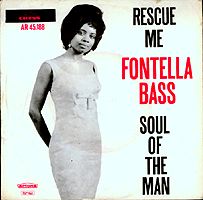Original recording
According to writer Robert Pruter in his book Chicago Soul, the song emerged from a songwriting and rehearsal, or "woodshedding", session at Chess Records: [11] " 'Rescue Me' was a terrific example of the Chess studio system at its finest... One Saturday in August 1965, Bass was sitting in a rehearsal studio with producers-writers Carl Smith and Raynard Miner. They were fooling around with the song when arranger Phil Wright walked in, and the ensuing four-way jam session brought forth 'Rescue Me'. [Billy] Davis produced the side..." Bass claimed that, although Smith, Miner and Davis had assured her that her contribution to authorship of the song's lyrics would be acknowledged, this was never done. [12] [1]
Bass recorded the song in three takes at Chess Studios in Chicago. Minnie Riperton provided background vocals, and Maurice White and Louis Satterfield, later of Earth, Wind & Fire, were on drums and bass respectively. [12] [1] Other musicians on the record included Gene Barge on tenor sax, Pete Cosey and Gerald Sims on guitar, Raynard Miner on piano, Sonny Thompson on organ, and Charles Stepney on vibes. [13] According to Bass, the call-and-response moans heard in the song's fade were unintentional. In an interview with The New York Times in 1989, she said, “When we were recording that, I forgot some of the words... Back then, you didn't stop while the tape was running, and I remembered from the church what to do if you forget the words. I sang, ‘Ummm, ummm, ummm,’ and it worked out just fine.” [14] [15]
This page is based on this
Wikipedia article Text is available under the
CC BY-SA 4.0 license; additional terms may apply.
Images, videos and audio are available under their respective licenses.
